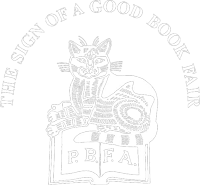
One of 1210 copies : In exceptional condition
Allinson, Francesca & Marx, Enid [Illus] ~ A Childhood : Signed By Enid Marx
Sole UK printing : The Hogarth Press, London : 1937
The sole UK printing published by the Hogarth Press, London in 1937. 8vo., pale blue cloth lettered in gilt to backstrip; in the rare illustrated wrapper, printed in black and blue; Hogarth Press vignette to title page; with 7 chapter-head wood engravings and the wrapper design by Enid Marx; The BOOK a wonderful, bright copy is in near Fine condition. Light pushing to the spine tips with a hint of toning to the text-block and clean internally. The WRAPPER, seldom found in such near Fine condition, with just a hint of toning to the edges. The wrapper is protected in a removable Brodart archival cover. The book has been signed (without dedication) by Enid Marx to the title page. First edition, sole UK printing, one of just 1210 copies issued by the Hogarth Press, and Marx’s only work for the Woolf’s (Woolmer 404). This copy from the personal library of Enid Marx, though with no indication of ownership. A Childhood was Allinson’s sole literary work. Born in 1902, Enid Ellen Pulvermacher Allinson was known as ‘Fresca’ for most of her life, and grew up in the company of artists, her mother being the German Jewish artist Anna Pulvermacher, and her oldest brother Adrian educated at the Slade Art School - he later went on to become a member of the London Group. Allison was introduced to the press via Alice Ritchie, who was herself both a worker and an author at the press. She had been introduced to Ritchie in turn through Enid Marx, a close friend whom she knew through the art world, and who shared her interest in folk songs. Allison’s life was cut sadly short when she committed suicide in 1945. A fictional biography, Allinson’s alter ego in A Childhood is Charlotte, a girl who holds the strict behaviour of her parents responsible for her inability to surrender herself to another person. “My mother’s restrained femininity, sobered through the worries and responsibilities of my father’s career, had prepared me for nothing like this”, she writes. Indeed, the author grew up in a rather close-knit family of non-conformists and radical pacifists, with her father in particular advocating a strict and unorthodox view concerning hygiene and diet. As she writes in her forward, “Charlotte is more like myself than anyone else… if she strikes you as odd, have patience with her'. She also takes liberties with the chronology of the book, noting “the seasons of one year pass and at the same time Charlotte grows from about nine to fourteen. I have left out all mention of her precise age; partly because it does not matter and partly because I have not wished to shut her in too closely within the exact hours and places of her own experiences”. In many ways, it could be argued that Virginia Woolf would find affinity with this style of writing, reminiscent of her own stream of consciousness style which dominated the majority of her own works. The author’s tragic death by drowning in 1945 is furthermore an eerie echo of Virginia Woolf’s in 1941. Exceedingly scarce with the wrapper and such attributes. Woolmer 404.
BINDING: Hardcover
CONDITION: Near Fine
JACKET: Near Fine
£1350



